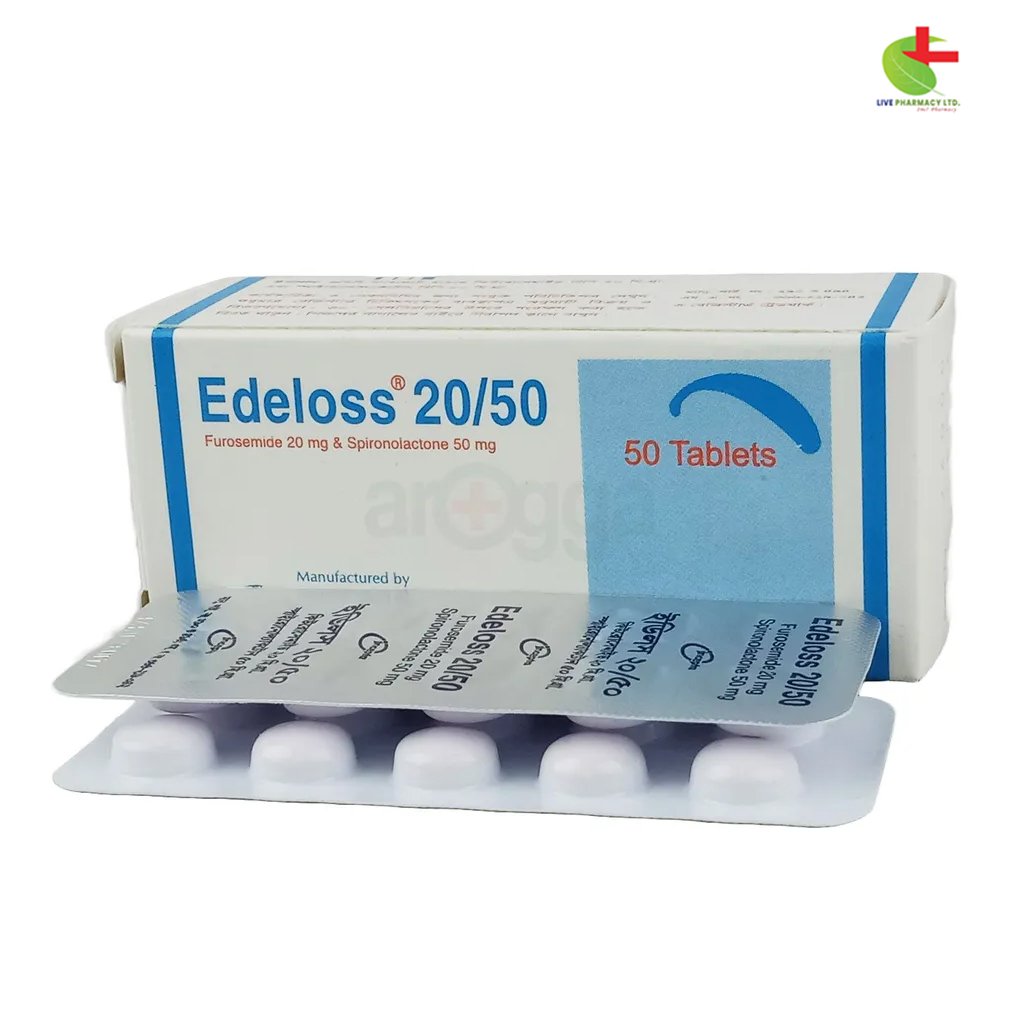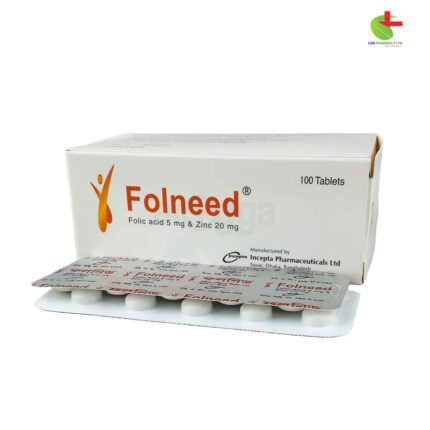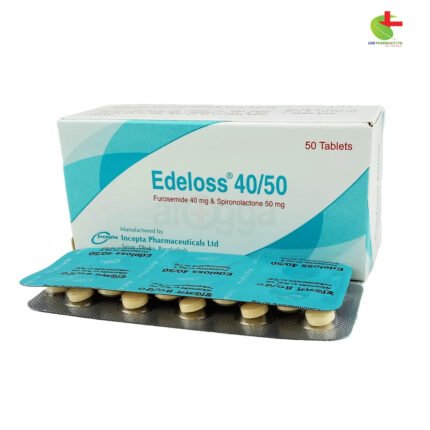Edeloss 20/50
80.00৳ Strip
- A potent combination of Frusemide and Spironolactone.
- Effectively manages essential hypertension, chronic heart failure, and fluid retention.
- Promotes diuresis while minimizing potassium loss.
- Suitable for patients with specific medical conditions.
- Always consult a registered physician before use for safety and effectiveness.
 Brand
Brand
|
Incepta Pharmaceuticals Ltd |
|---|---|
 Generics
Generics
|
Furosemide + Spironolactone |
 Type
Type
|
Tablet |
Indications
The combination of Frusemide and Spironolactone is recommended for the treatment of:
- Essential hypertension
- Chronic congestive heart failure
- Hepatic cirrhosis accompanied by fluid accumulation in the abdominal cavity (ascites)
- Edema resulting from fluid retention
- Hyperaldosteronism
- Resistant edema linked to secondary hyperaldosteronism
Always consult a registered physician before taking this medication.
Pharmacology
Frusemide (a loop diuretic) and Spironolactone (a potassium-sparing diuretic) operate through distinct yet complementary mechanisms. When used together, they provide a powerful diuretic effect. Frusemide targets the Na+/K+/2Cl- co-transporter in the ascending Loop of Henle, inhibiting the reabsorption of sodium, potassium, and chloride ions, which leads to increased sodium and water excretion. This can result in potassium loss. Conversely, Spironolactone inhibits sodium reabsorption in the distal tubule by blocking aldosterone, promoting sodium excretion while reducing the potassium loss caused by Frusemide.
Dosage & Administration
- Frusemide 20 mg and Spironolactone 50 mg: Take 1 to 4 tablets daily (equivalent to 20 to 80 mg of Frusemide and 50 to 200 mg of Spironolactone), based on patient response.
- Frusemide 40 mg and Spironolactone 50 mg: For patients requiring higher doses, take 1 to 2 tablets daily (40 to 80 mg of Frusemide and 50 to 100 mg of Spironolactone).
Note: This medication is not recommended for children, and elderly patients may experience slower excretion.
Always consult a registered physician before taking this medication.
Interactions
Using Frusemide and Spironolactone in conjunction with ACE inhibitors or potassium supplements may elevate the risk of hyperkalemia. Spironolactone can increase blood levels of cardiac glycosides like digoxin, potentially leading to digitalis toxicity. Corticosteroids may induce hypokalemia when used with Spironolactone. The diuretic and blood pressure-lowering effects of Frusemide may be diminished when combined with indomethacin or other NSAIDs. Additionally, Frusemide may enhance the ototoxic effects of aminoglycoside antibiotics, and co-administration with sucralfate could reduce its natriuretic and anti-hypertensive effects.
Contraindications
This combination is contraindicated in patients with:
- Anuria
- Acute renal insufficiency
- Severe renal impairment (creatinine clearance <30 ml/min)
- Hyperkalemia
- Addison’s disease
- Hypersensitivity to Spironolactone, Frusemide, or sulphonamides.
Side Effects
Potential side effects of Spironolactone may include headache, drowsiness, and gastrointestinal issues such as cramps and diarrhea. Other reported effects include ataxia, mental confusion, skin rashes, and possible gynaecomastia. Rarely, persistent breast enlargement and endocrine disorders like hirsutism and menstrual irregularities may occur. Patients may also experience transient increases in blood urea nitrogen and mild acidosis. Monitoring for hyponatremia and hyperkalemia is advised, as excessive diuresis can lead to dehydration and reduced blood volume, particularly in older adults, which may increase the risk of vascular thrombosis.
Pregnancy & Lactation
- Pregnancy: Spironolactone can cross the placenta, so its use in pregnant women should be carefully evaluated against potential risks. Animal studies suggest that Frusemide may lead to fetal abnormalities, and it should only be prescribed if adequate contraceptive measures are in place or if the benefits outweigh risks.
- Lactation: Metabolites of Spironolactone can be found in breast milk. If its use is essential, consider alternative infant feeding methods. Frusemide is also excreted in breast milk, necessitating the discontinuation of breastfeeding if treatment is required.
Precautions & Warnings
Exercise caution in patients prone to electrolyte imbalances. This medication should also be used judiciously in individuals with diabetes, enlarged prostate, hypotension, or hypovolemia.
Therapeutic Class
Potassium-sparing diuretics and aldosterone antagonists.
Storage Conditions
Store below 30°C, away from light and moisture. Keep out of reach of children.













Reviews
There are no reviews yet.